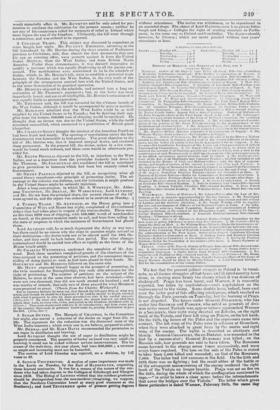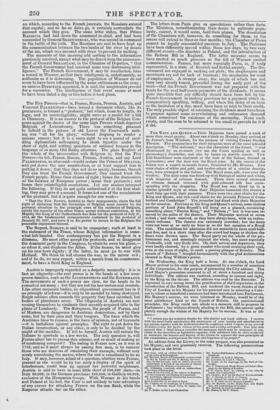• We fear that the present gallant struggle. in Poland
is to termi- nate, as all former struggles of that brave and ill-fated country have done, in riveting more firmly the chains which it was desirous:of shaking oft: Praga has been burnt, and Warsaw, it is currently reported, has fallen by capitulation-such capitulation as the wolves accord to the sheep. Some doubts have, indeed, been cast over the latter part of this afflicting intelligence, which reached us through the Paris journals on Thursday, but the burning of Praga is not, disputed. The forces under General DIEBITSCH, who has under him GEISMAR and PAHLEN, who acted as generals of divi- sion in the recent Turkish war, appear to have approached Warsaw in a !semicircle, their right wing directed on Zelecho,' on the right bank of the Vistula, and their left wing on Patens, on the left bank. On the 24th, th forces of the Poles and the oppressors came into contact. The left wing of the Poles were in advance at Groschow, when they were attacked in great force by the centre and right wing of the enemy. The battle is described as obstinate and bloody. General CHLOPICIZI, the ex-Dictator, was wounded in the foot -by a cannon-shot ; General ZYMIRSKI was killed ; on the Russian side, four generals are said to have fallen: The Russians Caine forward to the charge seven times successively, and were seven times repulsed. The loss on the side of the Poles is stated to have been 2,000 killed and wounded ; :on that of the Russians, 7,000. The latter had 150 cannons in the field. 0.n the 25th and 26th there was no fighting; but the result either of the battle or of the subsequent manceuvering of the enemy rendered the right bank of the Vistula no longer tenable. Praga was set.on fire on the 26th, during the whole of which the conflagration continued to rage,7--" in order to leave a clear space before the intrenchments that cover the bridges over the Vistula." The letter which gives these particulars is dated Warsaw, February 28th, the same day on which, according to the French journals, the Russians entered that capital; and so far as dates go, it certainly contradicts the account which they give. The same letter states, that Prince RAnzivir. had laid down the command in chief, and had been succeeded by General SKRZYNNECKI, who was second in command in the battle of the 24th. The Russians are said to have kept up the communication between the two banks of the river by means of the ice, which was covered with straw to prevent its melting. The accounts of this morning add nothing to the information previously received, except what may be drawn from the announce- ment of General SEBASTIANI, in the Chamber of Deputies, " that the French Government had received some very distressing intel- ligence." The French Government, it may be recollected, have a consul in Warsaw, so that their intelligence is, unfortunately, as authentic as it is distressing. The population of Warsaw do not seem to have been influenced by the same enthusiasm as the army ; as soon as DIEBITSCH appeared, it is said, the magistrates pressed for a surrender. The intelligence of that event seems at most to have been dated a day or two before it took place.



























 Previous page
Previous page